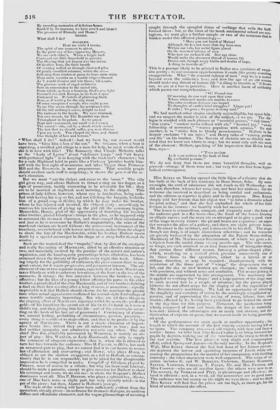Miss KELLY on :kfonday opened the little bijou of a
theatre that she has built at the hack of her residence in Dean Street, Soho. By some oversight, the card of admission did not reach us till Wednesday: we did not, therefore, witness her reception, nor hear her address; hut the welcome she received is described as being cordial and enthusiastic, and the address as reported is plain and to the purpose. Miss KELLY simply Mid her friends that her object was " to form a dramatic school for good acting," and that site had embarked the whole of her little fortune in the venture : we heartily wish her success. The house is commodious, compact, and elegantly neat : the form of the audience part is a flat horse-shoe, the front of the boxes forming art elliptic curve ; and the seats are so arranged as to give a gond view of the stage to every visiter : the pit and boxes are capacious; an upper tier occupies the place or a gallery, and there are eight private boxes. Mr. IlsetzLEr is the architect, ;nut it does credit to his skill. The stage, though not cheep, is of ample dimensions otherwise ; and its resources are greatly increased by the adaptation of the Patent Scene-shifting Machinery of' Mr. MAcouNALis STEPHENSON, of which we gave a de- scription from the model about twenty months ago. Tile side-scenes, or wings, arc each attached to an iron framework of triangular shape, that carries three different scenes, forming a prism-shaped pillar; which, revolving on a central pivot, presents successively one of its three faces to the spectators, either it) a lateral or an oblique direction, as may be required : simultaneously with the revolution of the three pair of " wings," the drop-scenes rise or fide and the sky or roof borders are changed; the whole working with precision, and without noise and confusion. Flat scenes joining in the middle are superseded by this arrangement. The machinery also is applied to working the " traps ;" and a large portion of the stage may be sunk several that in a coaple of minutes ; but the pieces played hitherto do not afford scope for the display' of all the capabilities of Mr. STs:PfmNSON'S machinery. We lad an opportunity of admiring the simplicity and certainty of action in the seemingly complicated ap- paratus, and of appreciating the saving of room, labour, time, and trouble, effeeted by it ; having been permitted to go behind the scenes in the day-time lit this purpose. Moreover, the mechanism being wholly composed of iron end brass, the danger of fire is materially lessened : indeed, the advantages are so many and obvious, and the diminution of expense so great, that we cannot doubt its being generally adopted. Of the performances we must speak at another opportunity ; the length to which the account of the new tragedy extends having left us 110 space. The company consists of old stagers, with here and there a novice : hence we infer that Miss KELLY'S plan is to bring fimrward her pupils by degrees, making use of the veterans or the troop to break m the raw recruits. The first piece—a very slight and commonplace affair, called Spring«nd elateme—is the only novelty. In the Sergeants Wift, Miss KELLv showed she had lost none of her former powers: she depicted the horror and agonizing suspense of Lisettc while wit- nessing the preparations for the murder of her companion, with thrilling intensity : the other characters were well supported. The corps of re- gulars includes G. and W. BENNETT, COM'TON, MORRIS BARNETT, SALTER, l'emeoLo, Comers, T. PARRY, 31r. and Mrs. FRANKS, and Miss COOPER—W110 are all familiar faces : the others were new to us. The scenery, by TOMKINS and PITT, is picturesque and effective ; the band is efficient ; and, in a word, all the accessories are in good taste. The audience was but scanty on the night we were there ; and we think Miss KELLY will find that the prices are too high, as times go, for the kind of entertainment she offers.


























 Previous page
Previous page